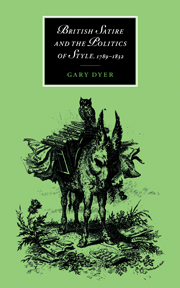Book contents
- Frontmatter
- Contents
- Acknowledgments
- Note on the text
- Introduction
- 1 The scope of satire, 1789–1832
- 2 The modes of satire and the politics of style
- 3 The meaning of Radical verse satire
- 4 Peacock, Disraeli, and the satirical prose narrative
- 5 Satire displaced, satire domesticated
- Notes
- Works cited
- A select bibliography of British satirical verse, 1789–1832
- Index
- Cambridge Studies in Romanticism
3 - The meaning of Radical verse satire
Published online by Cambridge University Press: 02 December 2009
- Frontmatter
- Contents
- Acknowledgments
- Note on the text
- Introduction
- 1 The scope of satire, 1789–1832
- 2 The modes of satire and the politics of style
- 3 The meaning of Radical verse satire
- 4 Peacock, Disraeli, and the satirical prose narrative
- 5 Satire displaced, satire domesticated
- Notes
- Works cited
- A select bibliography of British satirical verse, 1789–1832
- Index
- Cambridge Studies in Romanticism
Summary
Lord Strangford mentioned the day he called in Paternoster Row that he had had much conversation with Lord Casdereagh about me and that Lord C., in speaking of what I had written against him, said that the humorous & laughing things he did not at all mind, but the verses of the Tutor in the Fudge Family were quite another sort of thing and were “in very bad taste indeed” – This I can easily believe.
Thomas Moore, writing in his journal in 1820Questions which can not be fully answered without exposing the respondent to personal danger, are not entitled to a fair answer.
Coleridge, in his Biographia LiterariaThe significance and limitations of Juvenalian and Horatian satire in the Romantic period are clear; now we will examine texts that attempted to transcend the inadequacies of these modes, often by appropriating each of them. This third category includes several of the satires from the era that are most often read today and have received critical attention, works like Shelley's Peter Bell the Third (1819) and Byron's The Vision of Judgment(1822). The satires in this class take a radical stance on immediate political issues: they support such changes as parliamentary reform, Catholic emancipation, repeal of the Corn Laws, and liberalization of Britain's rule over Ireland.
What I am calling Radical satire draws on the tradition that Mikhail Bakhtin has analyzed as the “carnivalesque,” a variety of literary motifs and procedures with ties to such extraliterary practices as the festivals of medieval Europe: parodic representations, inversions of hierarchy, a rhetorical celebration of disorder, and – crucially for our subject – the juxtaposition of different narrative “voices” and different subgenres.
- Type
- Chapter
- Information
- British Satire and the Politics of Style, 1789–1832 , pp. 67 - 93Publisher: Cambridge University PressPrint publication year: 1997



